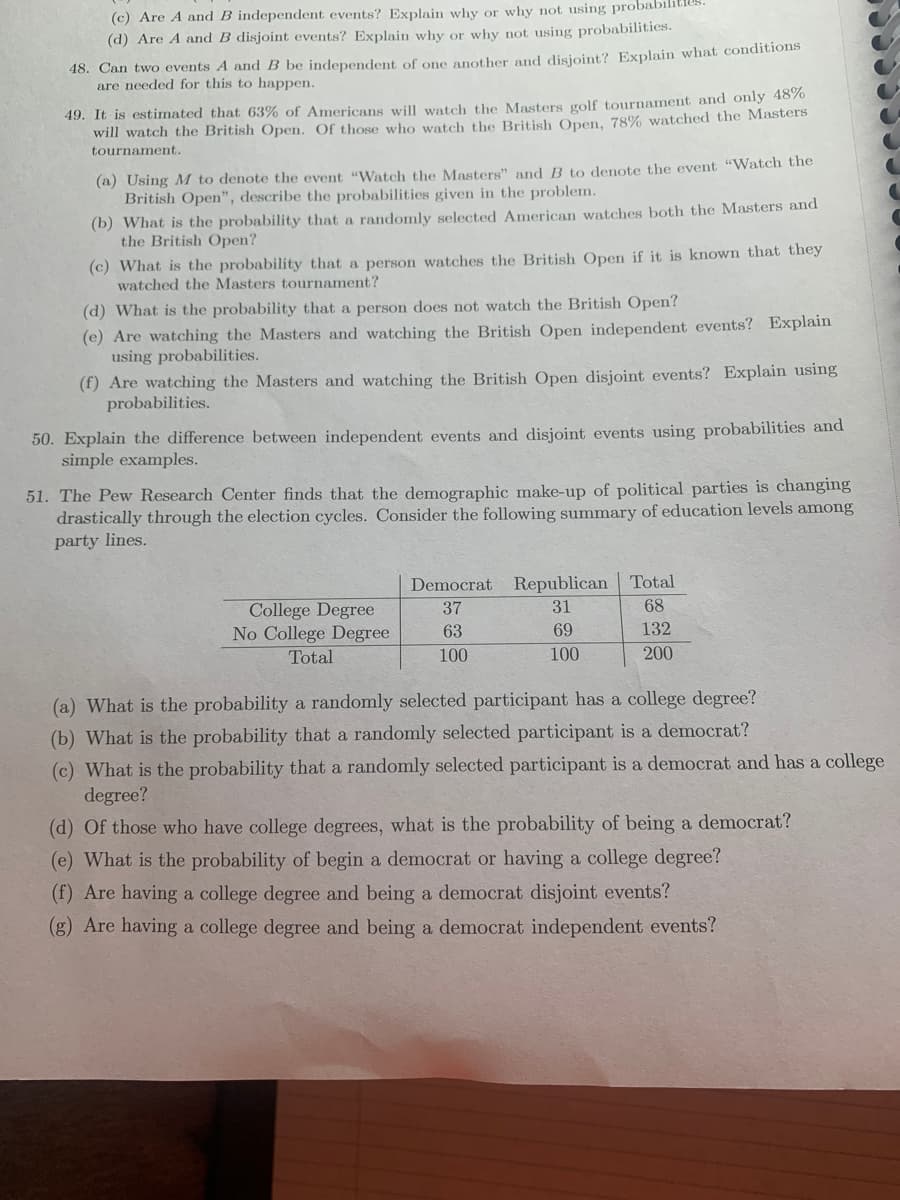. Explain the difference between independent events and disjoint events using probabilities and simple examples.
. Explain the difference between independent events and disjoint events using probabilities and simple examples.
MATLAB: An Introduction with Applications
6th Edition
ISBN:9781119256830
Author:Amos Gilat
Publisher:Amos Gilat
Chapter1: Starting With Matlab
Section: Chapter Questions
Problem 1P
Related questions
Question
Q50

Transcribed Image Text:(c) Are A and B independent events? Explain why or why not using probabilities.
(d) Are A and B disjoint events? Explain why or why not using probabilities.
48. Can two events A and B be independent of one another and disjoint? Explain what conditions
are needed for this to happen.
will watch the British Open. Of those who watch the British Open, 78% watched the Masters
tournament.
49. It is estimated that 63% of Americans will watch the Masters golf tournament and only 48%0
(a) Using M to denote the event "Watch the Masters" and B to denote the event "Watch the
British Open", describe the probabilities given in the problem.
(b) What is the probability that a randomly selected American watches both the Masters and
the British Open?
(c) What is the probability that a person watches the British Open if it is known that they
watched the Masters tournament?
(d) What is the probability that a person does not watch the British Open?
(e) Are watching the Masters and watching the British Open independent events? Explain
using probabilities.
(f) Are watching the Masters and watching the British Open disjoint events? Explain using
probabilities.
50. Explain the difference between independent events and disjoint events using probabilities and
simple examples.
51. The Pew Research Center finds that the demographic make-up of political parties is changing
drastically through the election cycles. Consider the following summary of education levels among
party lines.
Democrat Republican
Total
37
31
68
College Degree
No College Degree
63
69
132
Total
100
100
200
(a) What is the probability a randomly selected participant has a college degree?
(b) What is the probability that a randomly selected participant is a democrat?
(c) What is the probability that a randomly selected participant is a democrat and has a college
degree?
(d) Of those who have college degrees, what is the probability of being a democrat?
(e) What is the probability of begin a democrat or having a college degree?
(f) Are having a college degree and being a democrat disjoint events?
(g) Are having a college degree and being a democrat independent events?
Expert Solution
This question has been solved!
Explore an expertly crafted, step-by-step solution for a thorough understanding of key concepts.
This is a popular solution!
Trending now
This is a popular solution!
Step by step
Solved in 2 steps

Knowledge Booster
Learn more about
Need a deep-dive on the concept behind this application? Look no further. Learn more about this topic, statistics and related others by exploring similar questions and additional content below.Recommended textbooks for you

MATLAB: An Introduction with Applications
Statistics
ISBN:
9781119256830
Author:
Amos Gilat
Publisher:
John Wiley & Sons Inc

Probability and Statistics for Engineering and th…
Statistics
ISBN:
9781305251809
Author:
Jay L. Devore
Publisher:
Cengage Learning

Statistics for The Behavioral Sciences (MindTap C…
Statistics
ISBN:
9781305504912
Author:
Frederick J Gravetter, Larry B. Wallnau
Publisher:
Cengage Learning

MATLAB: An Introduction with Applications
Statistics
ISBN:
9781119256830
Author:
Amos Gilat
Publisher:
John Wiley & Sons Inc

Probability and Statistics for Engineering and th…
Statistics
ISBN:
9781305251809
Author:
Jay L. Devore
Publisher:
Cengage Learning

Statistics for The Behavioral Sciences (MindTap C…
Statistics
ISBN:
9781305504912
Author:
Frederick J Gravetter, Larry B. Wallnau
Publisher:
Cengage Learning

Elementary Statistics: Picturing the World (7th E…
Statistics
ISBN:
9780134683416
Author:
Ron Larson, Betsy Farber
Publisher:
PEARSON

The Basic Practice of Statistics
Statistics
ISBN:
9781319042578
Author:
David S. Moore, William I. Notz, Michael A. Fligner
Publisher:
W. H. Freeman

Introduction to the Practice of Statistics
Statistics
ISBN:
9781319013387
Author:
David S. Moore, George P. McCabe, Bruce A. Craig
Publisher:
W. H. Freeman